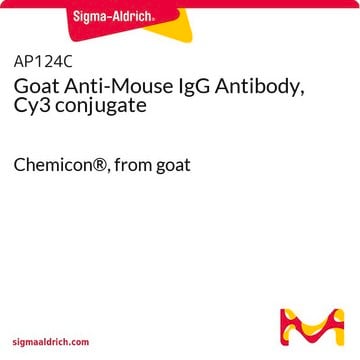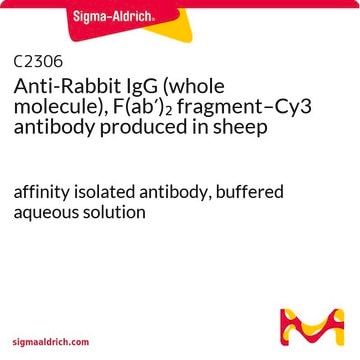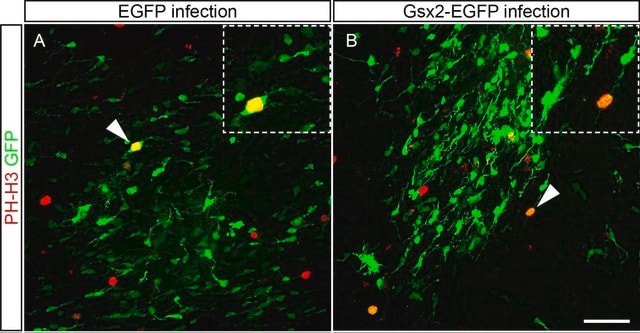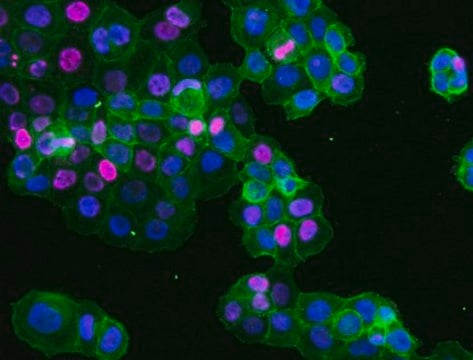AP181C
Goat Anti-Mouse IgG Antibody, Cy3 conjugate, Species Adsorbed
1.3 mg/mL, Chemicon®
Sign Into View Organizational & Contract Pricing
All Photos(1)
About This Item
UNSPSC Code:
12352203
eCl@ss:
32160702
NACRES:
NA.46
Recommended Products
biological source
goat
Quality Level
conjugate
CY3 conjugate
antibody form
F(ab′)2 fragment of affinity isolated antibody
antibody product type
secondary antibodies
clone
polyclonal
species reactivity
mouse
manufacturer/tradename
Chemicon®
concentration
1.3 mg/mL
technique(s)
immunofluorescence: suitable
shipped in
wet ice
target post-translational modification
unmodified
Specificity
Mouse IgG (H+L) (absorbed for minimal cross-reactivity to Rat, Human, Bovine and Horse Serum Proteins)
FLUOROPHORE/ PROTEIN ABSORBANCE RATIO:
A552/A280 = 2.3
FLUOROPHORE/ PROTEIN ABSORBANCE RATIO:
A552/A280 = 2.3
Application
Detect Mouse IgG using this Goat anti-Mouse IgG Antibody, Cy3 conjugate, Species Adsorbed validated for use in IF.
Research Category
Secondary & Control Antibodies
Secondary & Control Antibodies
Research Sub Category
Secondary Antibodies Adsorbed for Dual Labeling
Secondary Antibodies Adsorbed for Dual Labeling
Suggested dilution for most applications: 1:100-1:800 for most applications.Optimal working dilutions must be determined by the end user.
Physical form
Lyophilized. Buffer = 0.01 M Sodium Phosphate, 0.25 M NaCl, pH 7.6, with 15mg/mL BSA, 0.01% Thimerosal and 0.05% Sodium Azide.
RECONSTITUTION:
Reconstitute to 1 mg/mL with 0.5mL sterile distilled water.
RECONSTITUTION:
Reconstitute to 1 mg/mL with 0.5mL sterile distilled water.
Storage and Stability
Maintain lyophilized product at 2-8°C for up to 12 months. After reconstitution the product is stable for several weeks at 2-8°C as an undiluted liquid. For extended storage after reconstitution, add an equal volume of glycerol to make a final concentration of 50% glycerol followed by storage at -20°C in undiluted aliquots for up to 12 months. Please note the concentration of protein (and buffer salts) will decrease to one-half of the original after the addition of glycerol. Avoid repeated freeze/thaw cycles.
Legal Information
CHEMICON is a registered trademark of Merck KGaA, Darmstadt, Germany
Disclaimer
Unless otherwise stated in our catalog or other company documentation accompanying the product(s), our products are intended for research use only and are not to be used for any other purpose, which includes but is not limited to, unauthorized commercial uses, in vitro diagnostic uses, ex vivo or in vivo therapeutic uses or any type of consumption or application to humans or animals.
Not finding the right product?
Try our Product Selector Tool.
Hazard Statements
Precautionary Statements
Hazard Classifications
Aquatic Chronic 3
Storage Class Code
11 - Combustible Solids
WGK
WGK 3
Certificates of Analysis (COA)
Search for Certificates of Analysis (COA) by entering the products Lot/Batch Number. Lot and Batch Numbers can be found on a product’s label following the words ‘Lot’ or ‘Batch’.
Already Own This Product?
Find documentation for the products that you have recently purchased in the Document Library.
Sumeth Imsoonthornruksa et al.
Journal of molecular microbiology and biotechnology, 25(6), 372-380 (2015-11-20)
To reduce the cost of cytokines and growth factors in stem cell research, a simple method for the production of soluble and biological active human basic fibroblast growth factor (hbFGF) fusion protein in Escherichia coli was established. Under optimal conditions
Hsing-Yen Huang et al.
Developmental dynamics : an official publication of the American Association of Anatomists, 238(1), 232-240 (2008-12-20)
ADP-ribosylation factor-like 6 (Arl6) mutation is linked to human disease and Arl6 interacts with Arl6 interacting protein (Arl6ip). However, the expression pattern and function of Arl6ip during embryogenesis are unknown. To confirm whether abnormal Arl6ip function might result in embryonic
Cheng-Yung Lin et al.
The International journal of developmental biology, 59(10-12), 435-442 (2016-02-13)
Ras-related nuclear protein (Ran) is involved in cell division by regulating nucleocytoplasmic transport and modulating the assembly of tubulin. However, its function in embryonic development is unclear. We used zebrafish to study the roles of Ran in eye development. The
Rei Yoshimoto et al.
Frontiers in fungal biology, 3, 958798-958798 (2022-08-04)
The biogenesis of small non-coding RNAs is a molecular event that contributes to cellular functions. The basidiomycete fungus Ustilago maydis is a biotrophic pathogen parasitizing maize. A hallmark of its genome structure is an absence of RNAi machinery including Dicer
Filippo Perbellini et al.
Cardiovascular research, 114(1), 77-89 (2017-10-11)
Cardiac fibroblasts (CFs) are considered the principal regulators of cardiac fibrosis. Factors that influence CF activity are difficult to determine. When isolated and cultured in vitro, CFs undergo rapid phenotypic changes including increased expression of α-SMA. Here we describe a
Our team of scientists has experience in all areas of research including Life Science, Material Science, Chemical Synthesis, Chromatography, Analytical and many others.
Contact Technical Service








